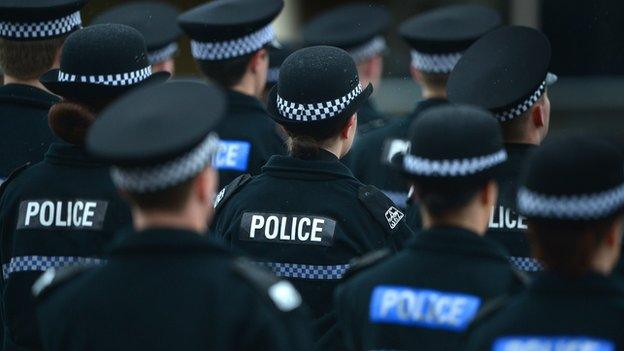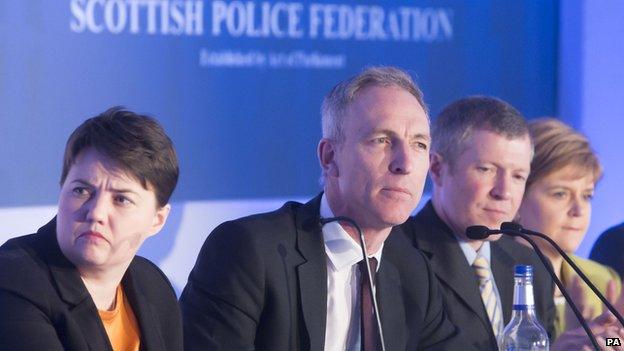Scottish Police Federation warns against more Police Scotland cuts
- Published

The organisation that represents Scotland's police officers has said the force can take no more operational cuts.
The chairman of the Scottish Police Federation (SPF) made the warning at the body's annual conference.
It comes after the chief constable of Police Scotland said cuts of £10.8m were needed over the next 12 months.
Scottish leaders from the four main political parties also spoke at the event.
It was held to mark the second anniversary of the single force.
'Extreme measures'
On Tuesday, Police Scotland chief constable Sir Stephen House said savings could be achieved, but it would take "extreme measures".
SPF chairman Brian Docherty dismissed this as "fanciful nonsense".
He told the conference in South Ayrshire: "Expecting the police to do more with less is fanciful nonsense.
"All that can be delivered with less, is less."

Scottish leaders from the four main political parties spoke at the conference
First Minister Nicola Sturgeon told those attending the conference that Police Scotland should be exempt from paying VAT - as are all other UK forces. The bill adds £23m each year to its costs.
"It is time to end that," she told delegates, adding she would continue to argue for a change.
But she reiterated her government's commitment to maintaining the strength of the police service at 1,000 officers more than when the SNP came to office in 2007.
Scottish Conservative leader Ruth Davidson told the conference her party would scrap automatic early release for prisoners and supported whole-life terms for certain forms of murder, including that of police officers.
Scottish Labour leader Jim Murphy said a lack of resources for support staff meant meticulous police work was coming to nothing.
He said Labour's plans to increase taxes for those earning more than £150,000 a year would help raise money to tackle the problem.
'Target culture'
Scottish Liberal Democrat leader Willie Rennie launched an outspoken attack on Police Scotland's chief constable.
He said officers had been let down by the reorganisation and claimed the Scottish government had taken its eye off the ball.
To applause, he criticised the "target culture" of the force, a description which has been disputed by the chief constable.
Mr Rennie said: "He (the chief constable) needs to be honest, he needs to be truthful, he needs to change his ways."
The conference follows the publication of a critical report into the use of non-statutory or "consensual" stop-and-search by HM Inspectorate of Constabulary in Scotland and a second report on the issue by Police Scotland.
The Scottish government responded by setting up a new advisory group to examine the use of stop-and-search powers in Scotland.
It will present recommendations by August so that any legislation needed can be included in the Criminal Justice (Scotland) Bill.